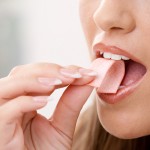
A recent review conducted by the same group as this new review (see Dental Elf 9th July 2012) suggested that the use of sugar free chewing gum used as an adjunct to toothbrushing provided a small but significant reduction in plaque scores. The aim of this review was to assess the clinical effects of medicated, sugar- free chewing gum containing antimicrobial agents or herbal extracts on plaque indices and parameters of gingival inflammation.
The Medline–PubMed, Cochrane Central Register of Controlled Trials (CENTRAL) and EMBASE databases were searched. Randomized controlled clinical trials (RCTs) or controlled clinical trials (CCTs) of medicated sugar-free chewing gum containing antimicrobial agents or herbal extracts conducted in adults aged 18 or over were included. Study selection, quality assessment and data abstraction was conducted independently and in duplicate. Only studies in English were considered.
- 14 studies were included; Considerable heterogeneity was observed regarding study design, evaluation period, oral prophylaxis, intervention, control and regimen. There were 10 non-brushing studies and four brushing studies. 9 studies were crossover design with washout periods varying from 2 to 10 days.
- Agents evaluated included chlorhexidine, urea, zinc gluconate, mastic, pycnogenol, funoran, eucalyptus extract and acacia.
- A meta-analysis using data from 3 studies was performed for chlorhexidine gum, which showed a positive effect on parameters of gingival health. However the authors considered the GRADE evidence profile to be ‘weak’.
The authors concluded
Most of the chewing gums with antimicrobial agents or herbal extracts were shown to have a positive effect with respect to plaque and gingivitis scores. The most compelling evidence was provided for chewing gum containing chlorhexidine. Meta-analysis and individual results indicate a beneficial effect of chlorhexidine on plaque inhibition. However, GRADE evidence profile shows that the recommendation to use chlorhexidine-gum to reduce plaque scores in the absence of brushing is considered to be ‘weak’. Other ingredients with positive outcomes on plaque scores are eucalyptus, acacia, funoran, Pycnogenol and mastic. Limited data with respect to gingivitis scores were available, and the following agents showed a positive effect: magnolia, eucalyptus and chlorhexidine.
Comment
The limitation of the search strategy to a relatively small number of databases and the restriction to English only studies is a limitation that the authors of this review highlight themselves. The restriction to published literature only may also be a drawback and the possibility of publication bias as a result, was also highlighted. The review does however contain a great deal of information about the studies they have been included although it only highlights commercial funding and support for one of the studies.
Links
Keukenmeester RS, Slot DE, Putt MS, Van der Weijden GA. The effect of medicated, sugar-free chewing gum on plaque and clinical parameters of gingival inflammation: a systematic review. Int J Dent Hygiene DOI: 10.1111/idh.12026
Dental Elf 9th July 2012 -Weak evidence shows small effect of sugar-free chewing gum on plaque
